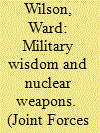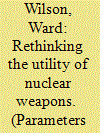| Srl | Item |
| 1 |
ID:
111128


|
|
|
|
|
| Publication |
2012.
|
| Summary/Abstract |
Responding to Derrin Culp's critique, the author argues that distinguished nuclear theorists may be wrong because groups of experts have been wrong in the past, that city attacks are central to nuclear deterrence theory because killing civilians en masse is what nuclear weapons do best, and that understanding how effective city attacks would be in war is crucial to understanding how well they would work as threats. Moreover, while it is undeniable that nuclear deterrence works some of the time, this simply is not good enough. Because any failure of nuclear deterrence could end in catastrophic nuclear war, nuclear deterrence must be perfect or almost perfect. This is a very difficult standard to reach.
|
|
|
|
|
|
|
|
|
|
|
|
|
|
|
|
| 2 |
ID:
128687


|
|
|
| 3 |
ID:
083834


|
|
|
|
|
| Publication |
2008.
|
| Summary/Abstract |
Nuclear deterrence is sometimes treated as a known quantity-a definite thing that keeps us safe and ensures our security. It has also often been used as a justification for possessing nuclear weapons. Nuclear deterrence, however, is based on an unexamined notion: the belief that the threat to destroy cities provides decisive leverage. An examination of history (including recent reinterpretations of the bombing of Hiroshima) shows that destroying cities rarely affects the outcome of wars. How is it possible that an action that is unlikely to be decisive can make an effective threat? Recent work on terrorism suggests that attacks against civilians are often not only ineffective but also counterproductive. And a review of the practical record of nuclear deterrence shows more obvious failures than obvious successes. Given this, the record of nuclear deterrence is far more problematic than most people assume. If no stronger rationale for keeping these dangerous weapons can be contrived, perhaps they should be banned
|
|
|
|
|
|
|
|
|
|
|
|
|
|
|
|
| 4 |
ID:
128607


|
|
|
| 5 |
ID:
122403


|
|
|
|
|
| Publication |
2012-13.
|
| Summary/Abstract |
The parameters of the discussion about nuclear weapons are well
known and appear to be relatively fixed. It seems as if there has
been little new on that front in forty years. Most civilian scholars
have lost interest in nuclear weapons and moved on to other topics. But
it is the habit of the military mind to learn from the past; even today
there are lessons to be learned from Cannae, Waterloo, and Vicksburg.
It will not surprise thoughtful military officers to find that the past has
something important and interesting to tell us about nuclear weapons.
|
|
|
|
|
|
|
|
|
|
|
|
|
|
|
|